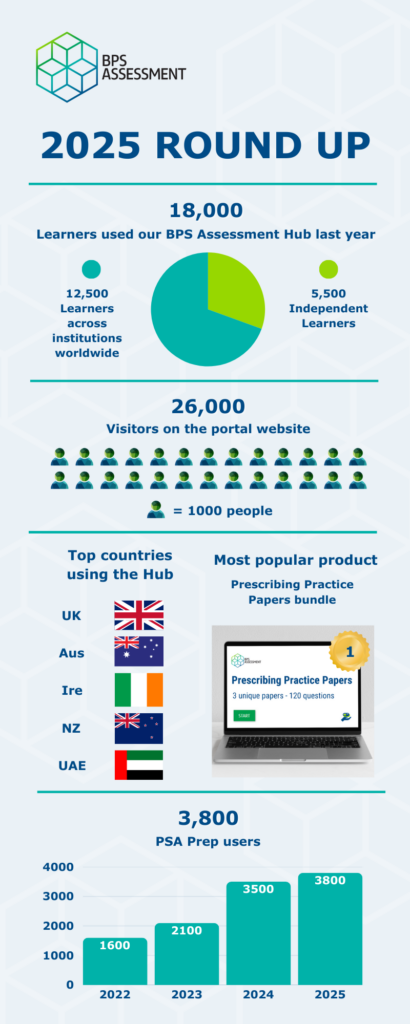2025 was a year of significant change for the team, and as we step into 2026, we’re excited to share some exciting news about new appointments to our Board.
These appointments bring a wealth of experience, expertise and fresh perspectives that will help shape the future direction of BPS Assessment. We’re delighted to introduce the talented individuals who will be guiding us through the next phase of growth and innovation.
Our new Board Members
Dr Neha Issar-Brown – Chief Executive Officer, BPS and Managing Director, BPS Assessment

Neha brings over 20 years of strategic and operational leadership across the UK and international health, research and innovation landscape to her dual role as CEO of BPS and MD of BPS Assessment.
Her impressive career includes senior leadership roles at major UK scientific and medical organisations, including UK Research and Innovation, the Medical Research Council, Fight for Sight and the Royal Society, where she shaped scientific research strategies, policy and funding at a national level.
Most recently, Neha has led several international projects in health and innovation and served as Director of Research and Health Intelligence at Arthritis UK, where she led the development of the charity’s first Research strategy. She currently chairs Quality for the NHS Integrated Care Board for Mid and South Essex, bringing a rich blend of experience across public, private and charity sectors.
Neha has led some of the UK’s largest cross-sector collaborations in multiple long-term conditions, precision medicine and healthy ageing. Her experience also includes developing international mobility policy for STEM researchers and serving as an advisory board member for the UK Global Talent route.
Dr John Bolodeoku – Chair of the Board

John brings extensive expertise as a Chemical Pathologist, Pharmaceutical Physician and entrepreneur. He completed his MBBS in 1986 from the University of Ibadan, Nigeria, followed by an MSc in Clinical Biochemistry from Keble College, Oxford, and an MBA from the University of Liverpool in 2008.
As a Fellow of the Royal College of Pathologists (awarded in 2008) and Fellow of the Royal Society of Biology (2021), John has worked in pharmaceutical medicine since 1997 across global, European and local country roles in drug development and medical affairs. He has held senior positions including Director, Senior Director and Vice President of Medical Affairs and Health Economics at Yamanouchi’s European Head Office in the Netherlands.
John is currently a Senior Lecturer at King’s College London and serves on several boards, having previously chaired the BPS Assessment Board for six years across two terms. His research interests include lipid metabolism, atherosclerosis and cancer biomarkers.
Lucy Murray – Non-Executive Director

Lucy Murray is a Sales Director with a strong track record of growing education and SaaS businesses across the UK and Europe. She brings hands-on experience selling into the same markets that BPS Assessment serves, giving her a practical understanding of how organisations adopt, scale and succeed with learning and assessment solutions, as well as the challenges they face.
Lucy has led international expansion for education-focused SaaS products, building commercial teams and partnerships across multiple European markets. She joins the BPS Assessment board to support its continued growth and international reach, helping extend access to high-quality prescribing education and assessment worldwide.
Shoshana Bloom – Non-Executive Director

Shoshana is a healthcare consultant with over 25 years’ experience in healthcare, spanning NHS and commercial sectors, working on innovation, digital transformation and service redesign. She works with clients to design and scale commercially, implement new services and technology that delivers measurable clinical, patient experience, and financial results.
Shoshana brings previous board-level perspective as a Non-Executive Director at Pharm@Sea Ltd, a subsidiary of University Hospitals Sussex NHS Trust, alongside prior experience from senior roles in global health businesses. She holds MSc degrees in Global Public Health and Collaborative Healthcare Management and contributes to digital health evidence base through own research and through peer review for international journals.
BPS President-Elec
Professor Simon Maxwell – President-Elect (2026-2028)

We’re also pleased to announce that British Pharmacology Society (BPS) members have voted for Professor Simon Maxwell to become President-Elect, a role he will hold from 1 January 2026 before commencing his Presidency on 1 January 2028.
Simon is Professor of Student Learning/Clinical Pharmacology and Director of Clinical Pharmacology & Therapeutics Teaching at the University of Edinburgh. His expertise in developing e-learning strategies to support Clinical Pharmacology and Therapeutics education has been transformative, and he brings valuable NHS clinical experience through his supervision of acute medical admissions and management of outpatients at increased cardiovascular risk.
As former Chair of the BPS Prescribing Committee, Simon was the lead author of the core curriculum for CPT teaching in UK medical schools. He also serves as Medical Director of the Prescribing Safety Assessment, the national online exam for UK medical students and doctors that tests competency in prescribing medicines safely.
He will also be a keynote speaker at the 20th World Congress of Basic & Clinical Pharmacology in Melbourne, Australia, in July 2026.
An exciting new chapter
These appointments mark an exciting new chapter for both BPS and BPS Assessment.
Professor Sir Mark Caulfield, President of BPS, said: “We are delighted to welcome our new board members. They bring deep expertise in research strategy, clinical practice, governance and a strong commitment to supporting scientific communities. Their leadership will be invaluable as we continue to champion pharmacology and support our diverse membership.”
Professor Cherry Wainwright, President of BPS, added: “These appointments come at a pivotal time for our community. The depth of experience and enthusiasm for strategic leadership in science and medicine that our new board members bring will be a tremendous asset as we continue to strengthen our influence and impact.”
Dr Neha Issar-Brown commented: “I am delighted to be joining BPS and BPS Assessment at a time when pharmacology has never been more important in the national research and health landscape. I’m excited to work alongside our exceptional community to build on the strong foundation and ensure we continue to drive influence, insight and impact across the UK and globally.”
We extend our warmest congratulations to all our new board members and look forward to the expertise and leadership they will bring.













